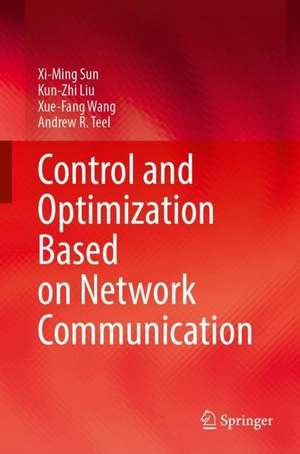Control and Optimization Based on Network Communication
Autor Xi-Ming Sun, Kun-Zhi Liu, Xue-Fang Wang, Andrew R. Teelen Limba Engleză Hardback – 18 mar 2023
This book aims at providing a modeling framework and analysis approach for the general nonlinear networked control systems based on the hybrid framework. The proposed results deal with very general nonlinear systems and help the readers understand the principle of nonlinear network-based control and optimization.
| Toate formatele și edițiile | Preț | Express |
|---|---|---|
| Paperback (1) | 669.89 lei 38-44 zile | |
| Springer Nature Singapore – 19 mar 2024 | 669.89 lei 38-44 zile | |
| Hardback (1) | 780.82 lei 3-5 săpt. | |
| Springer Nature Singapore – 18 mar 2023 | 780.82 lei 3-5 săpt. |
Preț: 780.82 lei
Preț vechi: 952.22 lei
-18% Nou
Puncte Express: 1171
Preț estimativ în valută:
149.44€ • 155.60$ • 126.29£
149.44€ • 155.60$ • 126.29£
Carte disponibilă
Livrare economică 17 februarie-03 martie
Preluare comenzi: 021 569.72.76
Specificații
ISBN-13: 9789811995330
ISBN-10: 9811995338
Pagini: 120
Ilustrații: XII, 120 p. 39 illus., 36 illus. in color.
Dimensiuni: 155 x 235 mm
Greutate: 0.41 kg
Ediția:2023
Editura: Springer Nature Singapore
Colecția Springer
Locul publicării:Singapore, Singapore
ISBN-10: 9811995338
Pagini: 120
Ilustrații: XII, 120 p. 39 illus., 36 illus. in color.
Dimensiuni: 155 x 235 mm
Greutate: 0.41 kg
Ediția:2023
Editura: Springer Nature Singapore
Colecția Springer
Locul publicării:Singapore, Singapore
Cuprins
Event-triggered control for nonlinear systems with stochastic dynamics, transmission instants and protocol.- Model-based controller.- Stability analysis of event-triggered nonlinear systems under stochastic DoS attacks.- Distributed optimization with network communication.- Distributed robust Nash equilibrium seeking for aggregative games under persistent attacks.- A distributed robust two-time-scale switched algorithm for constrained aggregative games.- Conclusions and perspectives.
Notă biografică
Xi-Ming Sun was born in 1973. He obtained his Ph.D. degree from Northeastern University, China, in 2006. After that he was a postdoc in University of Glamorgan, U.K, from 2006 to 2008. He visited the University of Melbourne,Australia, in 2009 and New York University, U.S., in 2011. He is currently a professor in the School of Control Science and Engineering, Dalian University of Technology. His research interests include hybrid systems, artificial intelligence, and networked control. He has published more than 180 papers on famous academic journals and international conferences. He has been the principle investigator of the Major Program of the National Natural Science Foundation of China and the National Key R&D Project of Ministry of Science and Technology of China. He serves as a member of the technical committee on Discrete Event Hybrid Systems and Networked Systems of IFAC, and on Control Theory and Application of Chinese Association of Automation. He also serves as anassociate editor of IEEE Transactions on Cybernetics, and is a member of the editorial board of Chinese Journal of Aeronautics.
Textul de pe ultima copertă
This book considers the problems of network-based control and optimization. As is known, network-based control has great advantages over traditional control systems because it may lead to easy installation and maintenance, low cost, and so on. Sometimes, network-based control is also necessary in many situations. For example, multi-agents may need to communicate with each other under wireless scenarios. On the other hand, the network may lead to some imperfect factors such as samplings, delays, transmission protocols, and packet losses. These factors may degrade the system performance and even lead to the instability of the control systems.
This book aims at providing a modeling framework and analysis approach for the general nonlinear networked control systems based on the hybrid framework. The proposed results deal with very general nonlinear systems and help the readers understand the principle of nonlinear network-based control and optimization.
Caracteristici
Provides hybrid modeling approaches for networked control and optimization systems Offers stability analysis approaches for networked control and optimization systems Presents theorems with nonlinear networked control systems with stochastic samplings and stochastic network attacks
